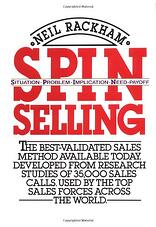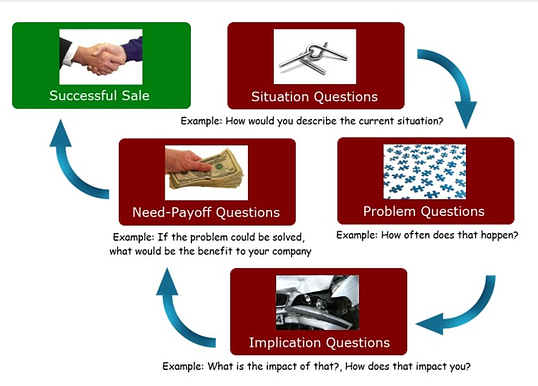I read another sales book recently that’s had a major impact on my methods for asking questions in selling situations. The book is “Spin Selling” by Neil Rackham. Neil conducted a major research project over multiple years to determine the optimal selling approach for large sales situations. If you’re in the B2B selling arena, this book should be a must read for you.
The book is “Spin Selling” by Neil Rackham. Neil conducted a major research project over multiple years to determine the optimal selling approach for large sales situations. If you’re in the B2B selling arena, this book should be a must read for you.
My biggest take-away from the book was the 4 types of questions to be asked in a sales situation and the sequence in which you ask them. This article provides a high level summary of the 4 types of questions that will lead to bigger sales, and should be a staple for any type of sales training.
The image below illustrates the 4 question types and the sequence in which they should be asked. For the sake of giving specific examples to illustrate how to apply these principles, I’ll provide examples based on selling sales training and process development services.

Situation questions
Situation questions should be asked at the beginning of a sales call once you’ve established rapport and the buyer is talking freely. These questions are meant to give you a sense for what the buyer is doing currently. Here are some examples…
- “How are you training your sales staff currently?”
- “How are you investing in the continued development of your sales team?”
- “What sales training programs have your salespeople completed?”
Questions of this nature get the buyer talking about what he has been and/or is doing relative to the services you are selling.
Problem questions
Problems questions come next and are designed to uncover “pain points” or problems the buyer is having. Following the Situation questions, here are some examples of Problem questions…
- “What improvements have you seen in the performance of your salespeople after their training?”
- “How well are you achieving your sales goals?”
- “How consistent are the sales performance levels of your individual salespeople?”
These questions will enable you to uncover what might be working and what’s not working. They help you determine what problems need to be solved and/or what pain the buyer is experiencing with his current situation.
It is important for me to emphasize that I never suggest a salesperson sell something to a buyer unless it will truly add value and solve a real problem. If after asking a series of good Problem questions you aren’t able to uncover a problem, congratulate the buyer and move onto to a better sales opportunity.
Implication questions
While Situation and Problem questions are common, Implication questions are somewhat unique. They are meant to transform the problems you discovered and bring to the surface the consequences or impact of those problems. Here are some examples of Implication questions…
- “How has the lack of improvement in sales performance affected overall company performance and profitability?”
- “What impact has the lower sales performance had on the morale and retention of your salespeople?’
- “What impact has not meeting your sales goals had on you personally?”
You can see Implication questions take the problem and make it real. It is best to prepare Implication questions ahead of time. In fact, I recommend you make a list of the 10 most relevant Implication questions associated with your product /service. Implication questions require you to think fast, so preparation will support your success.
Need-Payoff Questions
You’ve likely heard sales leaders talk about selling and pricing based on value. Well, Need-Payoff questions are key to determining the value of your solutions to the buyer’s problems. If you are able to show there will be a strong ROI from your solutions, the buyer will be much more likely to invest. Here are some examples…
- “If you saw just a 10% increase in sales performance from your sales team, what impact will that have on profitability?”
- “If your salespeople were more consistently achieving your sales commissions and bonuses, what impact would that have on salesperson retention?”
- “If you didn’t have to invest so much time coaching your lesser performers, how could you use that extra time to benefit overall company performance?”
In essence, Need-Payoff questions position to buyer to tell you how your product/service will benefit them, rather than you having to explain the benefits to the buyer. Wouldn’t it be great to have your buyer sell himself? That’s what Implication questions are designed to do.
In summary, the sequence of asking these 4 types of questions is meant to 1) understand the current situation, 2) uncover the problems and/or pain points from the current situation, 3) enable the buyer to understand the impact of the problems, and 4) help the customer see the value in your solutions. If you’ve asked the right questions and followed the sequence, your buyer will be ready to buy.





Agree, disagree, or just have something to add?
Leave a comment below.